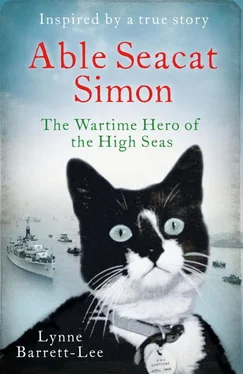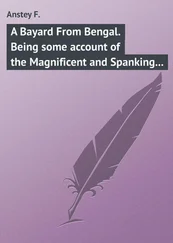So I did it, and he jerked as if he were a lizard struck by lightning. And with my jaw screaming in pain now, I came so close to losing him, so stunned and unbalanced was I by the strength he had left. But then I felt it – the soft crack of his neck, then the stillness. Even then, for the longest time, I stayed as I was, panting, still as night, still as death, not once daring to loosen my grip. It must have been a full minute before I judged it safe to release him, and let his body drop heavily between my paws.
‘He’s done it! He’s done it! He’s only gone and done it!’
Having little idea of how many had gathered to watch, I almost jumped a foot in the air. The deck felt alive beneath my paws, such was the outcry; feet were stamping, hands were clapping, men were cheering and whooping, buckets were being clanged, mops and brooms rapped against the bulkheads.
I looked up to see a beaming Lieutenant Hett approaching. He was all done up in his whites – he must have just returned from a shore trip – with his cap tucked under his arm so he could clap me as well.
Then he did something odd. He stopped right there in front of me, clicked his heels sharply and saluted me. ‘I officially promote you to the rank of able seaman,’ he told me, which caused a new round of cheers and applause to surge all around.
‘Don’t you mean able sea cat ?’ shouted someone. There was laughter.
Lieutenant Hett nodded. ‘Of course! I stand corrected. I hereby promote you to Able Seacat Simon. Ship’s ratter of the highest order! Good for you!’
Then, before I had a chance to stop him, he picked the rat up by the tail, which drew another tumultuous cheer. I felt my heart swell. I had done it. I’d really done it.
‘How about that , then?’ Lieutenant Hett said, lifting the rat high in the air, where it swung, turning a circle, grey-brown, amorphous and limp.
And very dead.
‘Farewell, Mao Tse-tung!’ he said, and launched it into the river.
I watched the rat disappear and heard the ‘plunk’ as it hit the water. A very satisfying ‘plunk’ it was too. Though I was still breathing hard and knew my jaw would ache for hours, I don’t think I could have felt happier if I’d tried.
But I didn’t spend a great deal of time on celebrations. I was too exhausted. I went back to the captain’s cabin, curled up on his bunk, and slept for some ten hours straight.
The demise of the infamous and much hated rodent Mao Tse-tung brought about a marked lift in everyone’s spirits. As for me, I couldn’t have been more thrilled, particularly with my new name of Able Seacat Simon, which I delighted in hearing called out wherever I went. The next couple of weeks saw a general cheeriness even, reaching a particular high when the clever electricians managed to tune us into a programme on the radio which I was assured was a great favourite of everyone on board, being transmitted by something called the BBC.
I didn’t know who or what the BBC was, but I didn’t need to. It didn’t last long, but there was laughter and chat and lots of singing, and – this did seem a miracle, especially when they said, ‘This one’s for Flight Lieutenant Fearnley!’ – it seemed much of the programme was dedicated to the crew of the Amethyst ; something to cheer us up and to let everyone on board know that they hadn’t been forgotten.
Which was precious. Because there was no doubt that, for all the peaks of jollity, the troughs of exhaustion and sadness and dejection were deep.
Most kept it hidden. Rather too well hidden, sometimes, I mused, so many of the sailors – particularly the ones who’d seen so much, suffered so much, had to tend to their dead and dying friends – feeling not quite able to articulate the shock and revulsion that I knew must regularly dance through their dreams. So I acted on what had now become a powerful instinct; I gave comfort where needed, in the shape of my physical presence and, increasingly, because sometimes the pain was buried deep, gave comfort where it wasn’t even known that it was needed.
It was the strangest thing – well, at first. I soon learned to understand it. I’d have a rating pick me up, seemingly at random, and then they’d pull me close to their face – their conscious mind assuming that they were petting me . And then that outbreath. That sigh. That realisation seeping into them. That, actually, it was the other way around.
If the communist garrison leader – a Colonel Kang – hoped to break the crew, and have the captain agree to his terms, he had underestimated the strength of everyone’s resolve. This was strengthened even further when, towards the end of June, three mail sacks got through to us, and better still came the news, following an otherwise fruitless meeting with Captain Kerans, that Kang was going to allow us to have delivered some of the reserves of fuel oil that were currently up in Nanking.
The captain, in a rare display of levity, almost clapped his hands together in glee. ‘Now that’s what I call a mistake!’ he told the officers. ‘I still can’t quite believe it, I really can’t.’
‘Perhaps there’s been an instruction from on high, sir,’ Hett suggested. ‘You know. Humanitarian grounds and that. It won’t look good if the men start dropping, will it?’
The captain scratched his head. I could see he was thinking about Kang. Though he’d not said it publicly, because he didn’t want to frighten the men, I knew he believed everything Kang did was threatening. That he would have no compunction, if we crossed him, about killing us all. ‘Hmm, perhaps there has,’ he said. Then his face fell. ‘Or perhaps he’s playing mind games again. I should have thought of that. We still have to get it.’
It would be a long wait, too, but knowing it was coming, and that it would make everyone’s lives so much more palatable in the increasing heat, raised everyone’s spirits right up again. Then, ten days later, we greeted the day – a rare fine one – with the sight of a tug boat towing a lighter, approaching from upriver.
It took a while to be sure, but as it drew nearer, a cheer went up all over the Amethyst , as it became obvious that what it carried was the promised supply of oil. At last we’d have the means to light and ventilate the ship properly – simple things perhaps, but, in our current straits, so important.
Everyone free to do so crowded the starboard guardrails. The happy expectation turned out to be short-lived, however. As the craft tried to approach our side, the tide had its own ideas about where the oil should be headed, thwarting every attempt to get alongside us, and pulling both tug and lighter away downstream.
There was no way it was going to get away without a fight, and, eventually, through the valiant efforts of the pilot (helped by Peggy, who barked encouragement throughout, possibly under the misapprehension that it held some dog food) the lighter was tied to us and the business of unloading it could begin. The only problem now – and it was a big one – was how that could be done. For all that the precious liquid was a godsend, every last drum of it, a little under three hundred drums would have to be hoisted on board and then drained into the oil fuel tank by hand.
But it was a challenge the men welcomed and they rolled their sleeves up willingly. They’d not had any decent exercise for some 82 days now, and everyone was feeling it. There was another wait first, because to do so at night would be too dangerous. With the dusk closing in, the captain decided ‘Operation Oil’ would have to wait until the morning.
No one seemed to mind the dawn reveille, and it was cheering to hear the determination and commitment in the crew’s voices as they began the mammoth task of transferring our welcome haul into the tank. It was a messy business; by lunch time there seemed to be oil everywhere. It was spilled on the decks, all over the crew and, less happily, up my nose – the smell of it being the nearest I decided I would like to get to it. It was hard enough to keep clean in the current conditions at the best of times, so I busied myself, as per usual, padding along all the still well-travelled rat runs, happy in the knowledge that the light and air and general lifting of spirits would help send the creatures back from where they came.
Читать дальше












